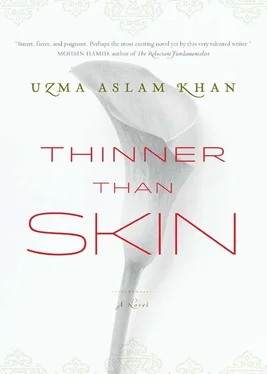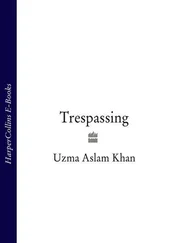On the walls of yet another shop, I read a telltale scrawl, Pipelineistan 4 Hu? Osama silk, dowdy dishware, and persecution weren’t all that brought men to this corridor. There was also oil. Between sweet green tea and salty pink tea, there was much opining about the Kazakh — Chinese deal, in which a 3,000-kilometer pipeline running through the Xinjiang Province would start pumping oil as early as next year. It was a throwback to the ties forged on the ancient Silk Road, but with a twist. Despite the billions of dollars invested, ethnic Kazakhs and Uyghurs still lived below the poverty line, deprived of their ancestral homes. These men were refugees; they were also fugitives. Not all hobbled, and many carried guns.
How many were twenty-first-century Raskolnikovs, seeking banishment most of all from themselves? Perhaps only Dostoyevsky would know.
It was getting late, and I didn’t wish to linger any longer through the night, not in a town I was only beginning to see. I left the muddy alleys and wound my way back toward the Gilgit River, a thick, brick-red arm of the Indus that chugged down Gilgit Valley like an impetuous train. As my footsteps grew more urgent, the rain started again, softly, yet even this caress seemed to aggravate the river’s march. It kicked; it heaved.
Before I’d left the store with the crippled Uyghur refugees, the shopkeeper, polishing the inside of a chipped teacup with his spit, had said something that now thundered in my head. “Our valley is tight, but not impassable, if you know the way. How we all arrrived at the same corridor from different corners of the world, now that may seem like a mystery, but it is not. We found a way. Why? Trade, yes, but most importantly, freedom. And we know you need three things to be free. Mountains, for security and glaciers; rivers, for drinking and irrigation; farmland, for food and money. Here we have all three. Which is why the government won’t leave us alone.” He put the cup away. “And why we help each other.” He then quoted a saying of the Prophet Mohammad: “In the beginning Islam was something strange and it will one day return as something strange.” I said I wasn’t familiar with the Hadith, but was glad to learn of it. The shopkeeper added, “It is why the Prophet gave glad tidings to the ghuraba. The strangers. ‘Blessed are the outsiders,’ he said, peace be upon him!”
I couldn’t confirm it, but I had a feeling, as I hurried along the rash river, that I was being watched. I would have liked to find the courage to turn left at the mosque, and even left again at the end of the road, where, I was sure of it, soon after leaving the shop, I’d seen our escort slip into the shadows. I would have liked to stare down whatever it was I would meet. But I kept on, till, eventually, I stepped to my right, into the hotel.
The next morning, I was not altogether surprised to find us hit with more delays.
First, there was the raid. Among the seized items were two cars; 35,000 kilograms of explosives; fifty computers; hundreds of guns; electronic goods (VCRs, toasters, blenders); furniture stolen from schools and banks. And rickshaws. Rickshaws were to be banned for fifteen days. The “found” goods were displayed at a press briefing. There were also two arrests, a blind man and a cripple who had to be propped semi-upright from the hips. These were the cream of the bad crop. They weren’t from Gilgit but from “outside the mountains.” Given how many people here were seeking sanctuary from somewhere else — including, I realized with a start, Farhana and I — it was hard to know who hadn’t come from outside the mountains.
Next, there were no buses leaving for Hunza that morning, and Nur Shah refused to take us in his jeep. We’d have to wait. Our journey’s motif.
By afternoon, the rumor had spread. The real reason for the arrests was to deliver a clear message to those at war with the country. The state could do what it wanted with the grazing grounds and water of the land. It could, if it wanted, give it all to China. Pakistan and China had a history of friendship, and those who tried to undermine the friendship would be arrested under Pakistan’s Prevention of Terrorism Act, and convicted on evidence. The evidence was before our eyes: the seized items, the blind man, the cripple. Those at war with any other government friendly to Pakistan — whether in North America or in Central Asia — would also be arrested.
Gilgit wore a gray cloud that day, thicker than any that cloaked the mountains around us. Everyone wants our land, people said. Everyone wants our rivers, our sea.
Others argued that this too would pass. The land had known many conflicts and many differences, but people had always found common interests on the Silk Road, and always would. Governments, on the other hand, would come and go. As would music. By nightfall, radios blared again from every shop, some with news, others, Bollywood hits.
Our foursome was suddenly a tiny part of the world congregating in this narrow corridor, whether for trade or freedom. I embraced our diminished status with relief. The spotlight here wasn’t on me but on a bigger game being played around me. I stayed in my hotel room that night. Irfan was away till very late; where he went, he wouldn’t say. He hadn’t been in our room the previous night either, when I returned from walking along the Gilgit River in the rain. I’d thought nothing of it. Though it may sound strange, I’d even hazard to say that when I finally heard Irfan climb into bed, after a quick flicking on and off of the lamp by his side, I felt much like the mountains enclosing us. Impenetrable.
Even when he said, in the dark, “In times of unrest, everyone is implicated.”
Always the optimist.
We go on. Leave it behind. Everyone is implicated. Our three mantras, blending into one.
I had this ridiculous image of Farhana and I running toward each other while people blew themselves up around us, and a bird swung circles in the sky, watching our grainy shadows crisscross in jerks. We couldn’t tell if the blood that draped every tree and every rock was caused by the stupid eye in the sky or the stupid bomber on the ground. And in the background, there was jaunty music, and people dancing. And in the extreme background, there was a green shalwar and a magenta shirt.
But it was only an image. We were safe.
Queen of the Mountains: Everyone Is Welcome
They had grown lean. The buffalo, especially; each hip had too many angles. Suleiman had been forced to buy supplementary feed, but once these stocks were gone, he could buy no more. The way the animals moved told Maryam that, like her, they wondered how many would not make it through the winter.
Her wrist still hurt.
On the day she smashed it, Suleiman had returned home with the horses she had left to wander into the field unsupervised.
“You know how valuable they are,” he began. “If we lost them, how would we climb the slopes to the pasture next summer?”
“On our feet,” Maryam muttered.
“Your feet cannot even carry you as far as your daughter.” Jumanah whimpered in his arms. “Though they carry you very well to your shrine.”
She waited, but without offering to take Jumanah from him, for the additional reason that she could not have held her with a broken wrist. She kept the arm hidden behind her back. She did not tell him that the animals did not need her to look after them. They were better off on their own, and perhaps he would be too.
His silence conveyed a thicket of disappointment she wished her body could hack through. Who was he to judge her, after all he had done? He was like the mare Namasha, righteous and mean. Well, she could stare them both down. Suleiman eventually limped away, still holding the baby.
Читать дальше












